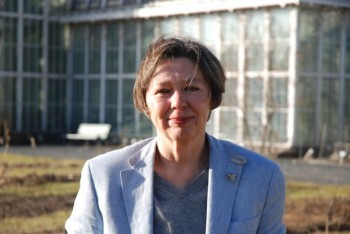Imagine
25 November 2014 | Authors, Reviews

Susanne Ringell. Photo: Anders Larsson
Dreams about and in the Eternal City. Leonard Cohen who plays a shanty by the Swedish poet Dan Andersson on the lute. The narrator of these prose poems gives birth to a daughter who is as small as a fountain pen, but perfect and just the right size – and she brings up a litter of puppies too.
This and much more is included in the wonderful new collection of prose poetry, Tärnornas station – en drömbok (‘The Lucia Maids’ station – a book of dreams’, Ellips, 2014) by Susanne Ringell (born 1955), one of the most personal voices in Finland-Swedish literature today. After an early career as an actress, she made her debut with a short story collection in 1993, and since then she has written short prose of different varieties, poetry, and plays. In Ringell’s work there is nothing amiss in the style and language, in the audacious combinations, in the chronicled sadness and the unwaveringly discrete humour. With fantastic clarity she approaches the most elusive of motifs, the deepest content of the soul, making it vivid and recognisable.
In one of the opening poems, the narrator experiences how alienation in one’s home town is interrupted by a streak of inclusion before the common obligation of sleep and dreaming: ‘In our most defenceless state we sleep ourselves nearer to one another, open and at rest we are not as entrenched as in the day when our limited will prevails, selects and deselects.’ Yes, when we are awake everything is more difficult, as the little girl with her burning candle at a school celebration on St Lucy’s Day, 13 December, experiences:
‘Once, when I was a little girl, I walked proud and glowing in the aisle for the school’s Lucia procession at the front of the grand hall. Once, when I was one of the little girls, I set fire to the actual Lucia’s blonde hair. I walked too close. I was too keen. / It was a mistake. /How do you walk closely but not too closely? How do you walk closely without making a mistake?’
The most important themes in Tärnornas station are perhaps just that, closeness and belonging. It grows from childlessness, a motif which has been strong throughout Ringell’s works, leading to the idea that a woman who is mother to no one can be mother to everyone. She who speaks sees her daughter everywhere, in all the Lucia maids she, with fond identification, observes around her. They also become a road to introspection, and to the reliving of relationships with her mother and other important older relatives. For those who have not reproduced, Ringells poems say, belonging is not self-evident. It has to be built up through the attentive reflection process that writing involves.
If this sounds abstract it is completely misleading. Ringell has an extraordinary eye for the concrete details, whether dreamed or real. This is her starting point when she creates a fictional world which feels completely familiar whilst at the same time being subject to its own laws. The boundaries between dream and reality, between internal and external, are fluid.
A large proportion of the poems occur during a trip to Rome and the stay in the city, at one time unknown and part of every normally educated westerner’s mental landscape, becomes a symbol of the narrator’s journey between dreams and memories, well known and unknown.
Translated by Claire Dickenson
Tags: poetry
No comments for this entry yet
Leave a comment
Also by Michel Ekman
Peter Sandström: Transparente blanche - 30 October 2014
Minority report - 20 February 2014
That which simply is - 24 October 2013
Speaking with silence - 26 September 2013
Becoming Finland - 23 May 2013
-
About the writer
Michel Ekman (born 1956) is a writer, critic and scholar who lives in Helsinki.
© Writers and translators. Anyone wishing to make use of material published on this website should apply to the Editors.
